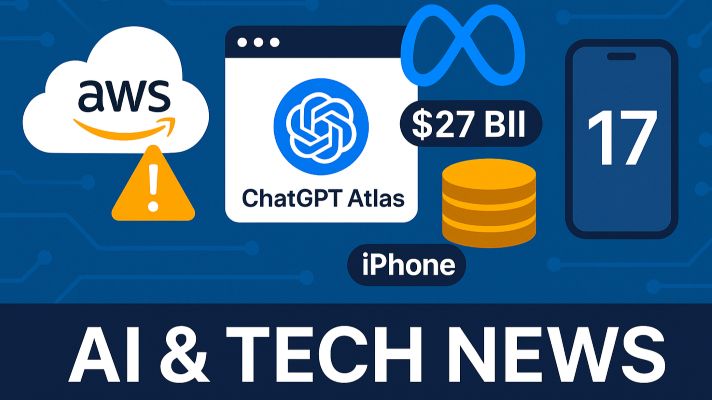AI Navigation
- articleAI Trends
- lightbulb_2AI Tips
- assistant_navigationAI Navigation
- heatHot Articles
- emergency_heat_2Hot Tips
- format_list_numberedPrompt Formatter
- psychologyTest Center(RPI)
AI & Tech Weekly (Oct 20–24): AWS Outage, OpenAI’s AI Browser, Meta’s $27B AI Datacenter Fund, Apple’s iPhone 17 Surge
The past week in AI and technology was nothing short of dramatic. From Amazon’s massive cloud outage to OpenAI’s new AI browser, Meta’s record-breaking financing deal, and fresh moves from Apple, Tesla, and Alibaba — the global tech landscape continues to evolve at lightning speed.

1. Amazon AWS Outage in US-East Region Triggers Global Service Disruptions
Amazon Web Services (AWS) suffered a severe outage in its US-East data center, disrupting DynamoDB and causing cascading failures worldwide. The outage affected a wide range of major companies including Claude, OpenAI, Perplexity, Duolingo, Manus, Robinhood, Coinbase, Venmo, Chime, Disney+, Apple TV, Snapchat, Reddit, Roblox, Fortnite, Steam, PlayStation Network, Xbox, and even McDonald’s.
Commentary:
The AWS East outage once again exposed the global internet’s single-point-of-failure problem. Even the biggest players cannot fully escape the domino effect of cloud dependency. From AI to finance, entertainment to social media — nearly everything “lives on the same cloud.” This event serves as a stark reminder that distributed architecture and multi-cloud redundancy are not optional luxuries, but strategic necessities.
2. OpenAI Launches AI Browser ChatGPT Atlas (Mac-Only for Now)
OpenAI officially launched its first AI-powered browser, ChatGPT Atlas, currently available for free download on macOS worldwide. Windows and mobile versions are expected soon. The browser introduces three key features:
-
A side panel for contextual web understanding;
-
“Browser memory” that records user activity and browsing history;
-
A premium “Agent mode” for tasks like purchasing, filling forms, and automating workflows.
Commentary:
OpenAI’s expansion from chatbot to browser marks a strategic ecosystem leap. Atlas isn’t just “ChatGPT inside a browser” — it’s a rethinking of how AI tools integrate with the web experience. With Perplexity launching Comet, the AI browser war has officially begun. If Atlas later supports GPT plug-ins or autonomous Agents, it could disrupt the entire extension ecosystem and create a new AI-native browsing paradigm.
3. Meta Raises $27 Billion with Blue Owl to Build the World’s Largest AI Datacenter
Meta, in partnership with private equity giant Blue Owl, raised $27 billion through a record-breaking private debt issuance to fund its AI datacenter initiative. Global bond powerhouse PIMCO contributed $18 billion, while BlackRock invested over $3 billion, becoming the second-largest participant.
Commentary:
Meta’s “Hyperion” project, based in Louisiana, marks its largest and most ambitious AI infrastructure investment to date. Led by Morgan Stanley, the deal is structured as a joint venture rather than direct borrowing, allowing Meta to lease compute capacity and recycle cash flows efficiently — a smarter alternative to traditional capex-heavy builds. The participation of PIMCO and BlackRock reflects sustained institutional confidence in AI infrastructure, though it also raises concerns about an emerging “AI financing bubble.” For Meta, however, this is a decisive and well-executed move toward fortifying its AI capacity.
4. iPhone 17 Sales Up 14% Over iPhone 16 in First 10 Days; Apple Cuts iPhone Air Production
In the first 10 days of launch across the US and China, iPhone 17 series sales exceeded iPhone 16 by 14%, driving Apple’s stock to new highs. However, demand for the iPhone Air has been underwhelming, prompting Apple to scale down production for Air and boost orders for flagship models instead.
Commentary:
Initially expected to represent 10–15% of total production (around 8–13 million units), iPhone Air was positioned as a transitional product before Apple’s 2026 foldable launch. Despite its simplicity, consumers favored premium models. By scaling down Air and reinforcing flagship supply, Apple is improving channel inventory, optimizing product mix, and strengthening margins. Most notably, iPhone 17’s success in both the US and China reaffirms Apple’s dominance in the high-end smartphone market.
5. Tesla Q3 Earnings: Revenue Up, Profit Down, Robotaxi to Drop Safety Drivers in Austin
Tesla reported Q3 FY2025 results with total revenue of $28.1 billion (+12% YoY) and net income of $1.37 billion (-37% YoY). Elon Musk announced that by year-end, most Robotaxi operations in Austin will no longer require safety drivers, with cumulative mileage already surpassing 250,000 miles.
Commentary:
Tesla’s record 497,000 deliveries (+7.3% YoY) and a massive 81% surge in energy storage deployments highlight its multi-engine growth. Yet, profit pressure persists due to lower automotive margins and higher R&D intensity. With twin focuses on “AI/data infrastructure” and “Robotaxi commercialization,” Tesla’s capex and R&D spend are set to remain high.
Removing safety drivers in Austin marks a crucial leap from testing to early commercialization. Once fully deployed, FSD will transition from a driver-assistance product to a true mobility service — potentially redefining Tesla’s valuation model.
6. Alibaba Launches Quark AI Glasses
Alibaba unveiled its first self-developed Quark AI Glasses, now available for pre-order on Tmall. Priced at ¥3,999 (¥3,699 for 88VIP members), the device supports navigation, Alipay payment, and Taobao image recognition. It features a dual-battery system with hot-swappable main cells and will begin shipping in early December.
Commentary:
The Quark AI Glasses run on Qualcomm’s AR1 chipset paired with a low-power coprocessor, integrating Alibaba’s Tongyi Qianwen model and Quark AI system for multimodal perception and semantic understanding. It achieves a seamless flow from recognition to interaction to payment — an end-to-end AI shopping experience.
Although the price tag is steep, this launch signals Alibaba’s ambition to lead AI consumerization. From search to productivity to wearables, Alibaba is steadily building an integrated AI hardware ecosystem.
From cloud outages and AI browsers to trillion-dollar infrastructure bets, this week proved that the AI revolution is accelerating — not just in labs, but in markets, devices, and regulation. The boundaries between tech, creativity, and capital have never been thinner.
For more AI updates, business insights, and tech trends, visit iaiseek.com